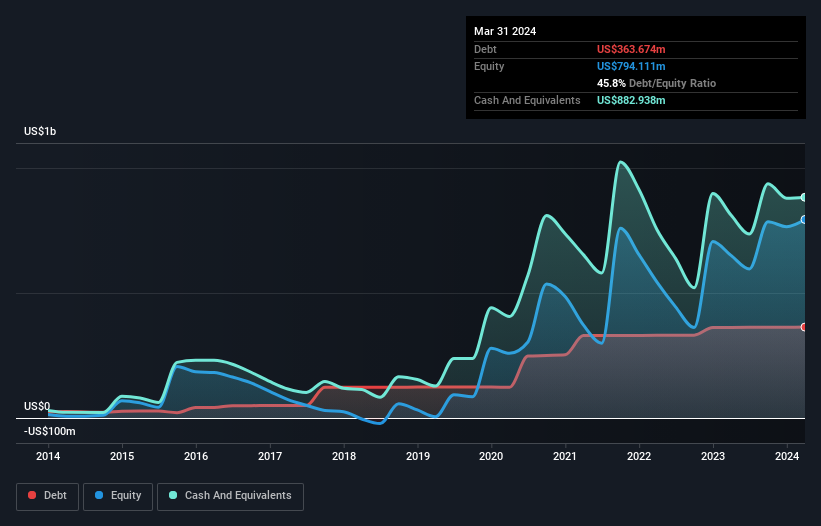
Warren Buffett famously said, 'Volatility is far from synonymous with risk.' It's only natural to consider a company's balance sheet when you examine how risky it is, since debt is often involved when a business collapses. As with many other companies Natera, Inc. (NASDAQ:NTRA) makes use of debt. But the more important question is: how much risk is that debt creating?
What Risk Does Debt Bring?
Generally speaking, debt only becomes a real problem when a company can't easily pay it off, either by raising capital or with its own cash flow. If things get really bad, the lenders can take control of the business. While that is not too common, we often do see indebted companies permanently diluting shareholders because lenders force them to raise capital at a distressed price. Of course, the upside of debt is that it often represents cheap capital, especially when it replaces dilution in a company with the ability to reinvest at high rates of return. The first step when considering a company's debt levels is to consider its cash and debt together.
View our latest analysis for Natera
How Much Debt Does Natera Carry?
The chart below, which you can click on for greater detail, shows that Natera had US$363.7m in debt in March 2024; about the same as the year before. But on the other hand it also has US$882.9m in cash, leading to a US$519.3m net cash position.

How Strong Is Natera's Balance Sheet?
The latest balance sheet data shows that Natera had liabilities of US$305.9m due within a year, and liabilities of US$368.1m falling due after that. Offsetting these obligations, it had cash of US$882.9m as well as receivables valued at US$288.7m due within 12 months. So it can boast US$497.6m more liquid assets than total liabilities.
This surplus suggests that Natera has a conservative balance sheet, and could probably eliminate its debt without much difficulty. Succinctly put, Natera boasts net cash, so it's fair to say it does not have a heavy debt load! The balance sheet is clearly the area to focus on when you are analysing debt. But it is future earnings, more than anything, that will determine Natera's ability to maintain a healthy balance sheet going forward. So if you want to see what the professionals think, you might find this free report on analyst profit forecasts to be interesting.
In the last year Natera wasn't profitable at an EBIT level, but managed to grow its revenue by 39%, to US$1.2b. Shareholders probably have their fingers crossed that it can grow its way to profits.
So How Risky Is Natera?
We have no doubt that loss making companies are, in general, riskier than profitable ones. And we do note that Natera had an earnings before interest and tax (EBIT) loss, over the last year. And over the same period it saw negative free cash outflow of US$197m and booked a US$365m accounting loss. But the saving grace is the US$519.3m on the balance sheet. That means it could keep spending at its current rate for more than two years. Natera's revenue growth shone bright over the last year, so it may well be in a position to turn a profit in due course. By investing before those profits, shareholders take on more risk in the hope of bigger rewards. The balance sheet is clearly the area to focus on when you are analysing debt. But ultimately, every company can contain risks that exist outside of the balance sheet. Be aware that Natera is showing 2 warning signs in our investment analysis , you should know about...
If you're interested in investing in businesses that can grow profits without the burden of debt, then check out this free list of growing businesses that have net cash on the balance sheet.
Valuation is complex, but we're here to simplify it.
Discover if Natera might be undervalued or overvalued with our detailed analysis, featuring fair value estimates, potential risks, dividends, insider trades, and its financial condition.
Access Free AnalysisHave feedback on this article? Concerned about the content? Get in touch with us directly. Alternatively, email editorial-team (at) simplywallst.com.
This article by Simply Wall St is general in nature. We provide commentary based on historical data and analyst forecasts only using an unbiased methodology and our articles are not intended to be financial advice. It does not constitute a recommendation to buy or sell any stock, and does not take account of your objectives, or your financial situation. We aim to bring you long-term focused analysis driven by fundamental data. Note that our analysis may not factor in the latest price-sensitive company announcements or qualitative material. Simply Wall St has no position in any stocks mentioned.
Have feedback on this article? Concerned about the content? Get in touch with us directly. Alternatively, email editorial-team@simplywallst.com
About NasdaqGS:NTRA
Natera
A diagnostics company, provides molecular testing services worldwide.
Flawless balance sheet with reasonable growth potential.
Similar Companies
Market Insights
Community Narratives



